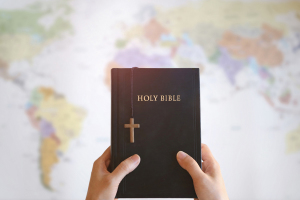Christianity's Edge over Islam in Holy Book War
Believers of Christianity and Islam are competing to spread their respective holy book around the world, but distributors of the Bible have some advantages over the Koran.
The Bible is translated into 2,426 languages (complete or in part) and counting, including 900 English versions ranging from street slang to comic book-like translations, according to The Economist. On the other hand, the Koran is disadvantaged by the belief by some that the word of God must not be changed, even translation-wise.
Although most Muslims now accept translation of the Koran, it is still widely held that reading and memorizing the Koran in Arabic is superior. There are only 20 English versions of the Koran compared to the nearly 1,000 versions of the Bible in the same language.
Another advantage of the Bible is the sheer larger quantity of Bibles distributed compared to the Koran. Over 100 million copies of the Bibles are sold or given away each year.
In comparison, oil-rich Saudi Arabia, the main player in the printing and distribution of the Koran and Islamic teaching materials, gives away some 30 million Korans a year around the world through the Muslim World League or wealthy individuals.
Bible distribution is helped by Christian missionaries who work to spread the Gospel to every tribe and tongue. Through the missionaries, the Word of God has reached even the most remote jungles in the world.
While evangelism in Islam exists, it is largely confined to regions where the religion is already strong and less active in regions where people have never heard of Islam before. In other words, Islam's growth is more dependent on internal population growth than conversion.
Another Bible distribution advantage is the factor of finance. The United States, the world's richest and more powerful country, is the largest financer of Christian organizations and plays a huge role in marketing the Holy Book.
In the United States, Bible publishing is big business in which annual Bible sales are worth between $425 and $650 million, according to The Economist. Publishing house Thomas Nelson alone made $473 million in 2005. Moreover, secular publishers have also jumped into the rising religious bookselling market. HarperCollins recently bought the Bible publishing house Zondervan.
American Bible marketers have drawn on modern technology to sell and spread the Bible, including the Internet, TV and radio stations, palm pilots, cell phones, MP3 players, and iPods.
Christians have thus far found more ways of getting the Bible in the hands, computer monitors and iPods of people around the world than Muslims. Currently, there are some 2 billion Christians in the world compared to 1.5 billion Muslims. But Muslims are growing at a faster rate than Christians, moreso due to birth rates than conversion.



























